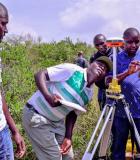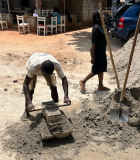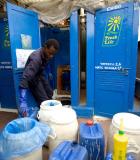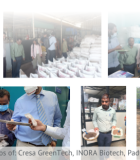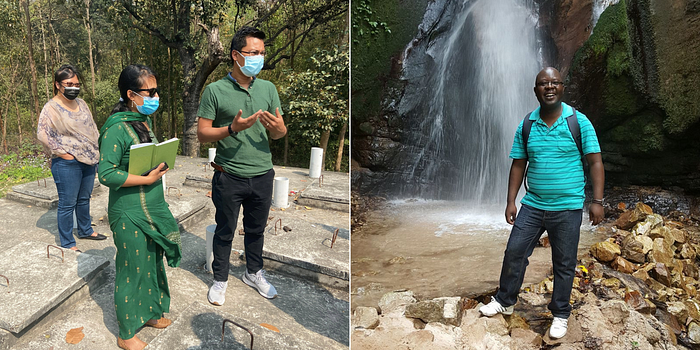
Photos courtesy of Pragya Shrestha and Francis Mtitu
From sustaining life to powering economies, water touches all aspects of our lives.
The unfortunate truth, however, is that even in 2023 billions of people worldwide lack access to water and sanitation services and over half the world’s population experiences severe water insecurity at least one month per year. This worsens health outcomes, undermines economic growth, and increases the likelihood of water-related conflict.
In the face of these daunting challenges, it’s important to stop and celebrate the progress we have made as an Agency and worldwide in increasing access to water and sanitation. This means also celebrating the leadership of USAID’s Foreign Service Nationals whose local knowledge, technical expertise, and dedication undergird the ability of the U.S. Government to extend access to water and sanitation for millions of people around the world.
That’s why today on World Water Day, we’re proud to announce the recipients of our 2023 Water Warrior Awards: Pragya Shrestha from Nepal and Francis Mtitu from Tanzania.
Both Pragya and Francis lead programming in two of USAID’s Global Water Strategy High Priority Countries. These countries span Asia, Africa, and Latin America, and are home to the majority of people who lack access to effectively managed drinking water and sanitation. Pragya and Francis embody the very best of the Agency’s values as they work tirelessly to ensure access to water and sanitation for their home countries.
Photo courtesy of Pragya Shrestha
Meet Pragya Shrestha
Pragya has served as an Environmental Health Specialist at USAID’s Mission in Nepal since 2011. Before coming to USAID, Pragya worked as a community activist, and then as a policy advocate for water security, sanitation, and hygiene (WSSH). Both experiences gave her keen insight into local contexts and WSSH issues, enabling her to lead high-impact programming that centers communities and local knowledge.
“When you know the reality on the ground and you understand the community you are working in,” she explains, “then it becomes easier to design a project more holistically.”
Holistic design is exactly what is needed to tackle water challenges in Nepal, where two million people lack access to safe drinking water and six million lack access to basic sanitation. Pragya is well-known for her success in coordinating across sectors, whether between different Nepalese government ministries or across Agency offices.
“Water is a cross-cutting theme. It’s not only for drinking water. It’s for agricultural productivity, for energy, and for the environment,” Pragya says.
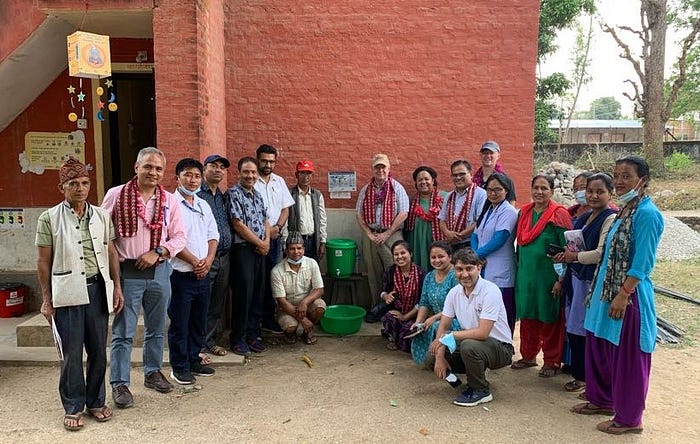
Photo courtesy of Pragya Shrestha
That’s why USAID Karnali Water, under Pragya’s leadership, works with local communities and governments at the watershed level to sustainably manage water resources, including reconciling competing water demands across uses. By zooming out to increase access to drinking water at its source, the activity has also improved the availability of water for other uses such as agriculture and energy.
“For me, the best part of this activity is the collaboration, including bringing together different kinds of funding from USAID offices and supporting different types of Nepalese ministries to work together and speak about these challenges,” Pragya says.

Photo courtesy of Francis Mtitu
Meet Francis Mtitu
Francis Mtitu has worked as Project Management Specialist supporting WSSH at USAID’s Mission in Tanzania since 2016, building upon 20 years of experience working for various international WSSH NGOs in Tanzania. He also co-chairs the Tanzania WSSH Development Partners Group and its coordination with the Government of Tanzania in the design of the country’s Water Sector Development Program.
Like Pragya, Francis sees water as key to improving other development outcomes in Tanzania, where approximately 23 million people live without access to basic water and 40 million live without access to basic sanitation.
The Government of Tanzania shares Mtitu’s conviction about the centrality of water for development.
He explains: “Tanzania is putting water, sanitation, and hygiene as a driver of development in Tanzania because we understand that water is key to other sectors. You cannot talk about improving public health without water supply or water and sanitation services or talk about investments in agriculture or hydropower generation if you do not have well-managed water resources.”

Photo courtesy of Francis Mtitu
For Francis, the most exciting part of working for USAID is the Agency’s commitment to accelerating and sustaining access to water and sanitation by working with Tanzanian partners to strengthen local systems and fill the gaps. Francis believes that this approach enables partners to design, implement, and manage water and sanitation that “last forever. I like to use the word forever because it lasts beyond the design of a program.”
Francis leads the USAID Maji Na Usafi Wa Mazingira (MUM) activity, which works directly with national, regional, and district stakeholders in 10 districts in Tanzania to expand access to water and sanitation services, and broaden water resources management stakeholder engagement by strengthening organizational systems and services, market-based solutions, and learning.
Francis says that under MUM, “we are thinking about the sustainability of water systems before the water system is constructed. It is an approach utilized by a USAID-funded project that will last beyond a USAID-funded project.”
Francis credits USAID’s openness to learning and new approaches to the success of MUM. “USAID gives the opportunity to be creative, to design and try new ways of doing things.”
Advice to Advance Water Security, Sanitation & Hygiene
Both Pragya and Francis encourage other development professionals to consider working at USAID.
Says Pragya: “USAID has a really good water and sanitation portfolio, so the opportunity is very exciting. When you work at USAID, you’re able to serve in the design role and influence policy at the government level.”
And Francis added: “It is a rewarding opportunity to work at the Agency because it gives me the opportunity to design projects at the quality that a person in the sector would love to see. It also gives me the ability to serve my fellow Tanzanians through this partnership between the Governments of Tanzania and the United States of America.”
Since 2008, USAID has helped nearly 65 million people gain access to sustainable drinking water services and 50 million people gain access to sustainable sanitation.
By 2027, USAID plans to reach 22 million more people with access to sustainable drinking water and 22 million more with access to sustainable sanitation.
The local knowledge, technical expertise, and determination of the Agency’s Foreign Service National WSSH leads will continue to be foundational to USAID’s approach to accelerate and sustain progress in water and sanitation.
This World Water Day, please join USAID in celebrating Pragya, Francis, and all our USAID staff working tirelessly on water and sanitation around the globe.
This blog was originally featured on USAID's Medium.


